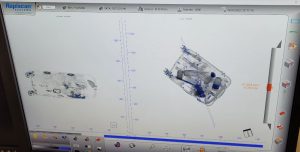
The Department of Agriculture, Fisheries and Forestry (DAFF) has installed two new cutting-edge 3D x-ray units at Brisbane and Melbourne international airports, trialling the screening of incoming baggage for biosecurity risks.
The devastation caused by the current varroa mite incursion, and the ongoing real threat of Xylella fastidiosa being brought to our shores via infected plant material or stowaway vectors, are clear evidence of the importance of increased biosecurity monitoring and make this very good news indeed.
Deputy Secretary of Biosecurity and Compliance Dr Chris Locke said the installations are an important first step toward enabling more informed biosecurity decision-making while improving the passenger experience with a faster and more streamlined clearance process.
“Airport biosecurity officers play a critical role in keeping exotic pests and diseases from entering Australia. It’s important that they have the right technology to support this important work,” Dr Locke said.
“The 3D x-ray units have been integrated with existing back-of-house baggage handling systems and have been developed in close partnership with Brisbane Airport Corporation and Australia Pacific Airports (Melbourne).
“Scanned bags will be traced from the carousel to the marshal points and inspection areas in the arrivals hall, to allow for efficient processing and inspections.
“Biosecurity officers will assess the 3D x-ray images from a remote screening room, separate to officers working in the arrivals hall. They’ll be supported by assistive biosecurity detection algorithms to efficiently identify and examine concealed items that could pose a biosecurity risk.
“Exotic pests and diseases are a threat to our agricultural industries, environment and our international reputation as producer and exporter of safe and premium food. So it’s exciting to see this technology now being trialled under real-world conditions and supporting the invaluable work of our biosecurity officers.”
Implementation timeline
Initial testing commenced in August and will continue through the year, providing valuable baseline data on the system’s effectiveness and screening decision timeframes. Passenger intervention trials are expected to begin in mid-2024.



